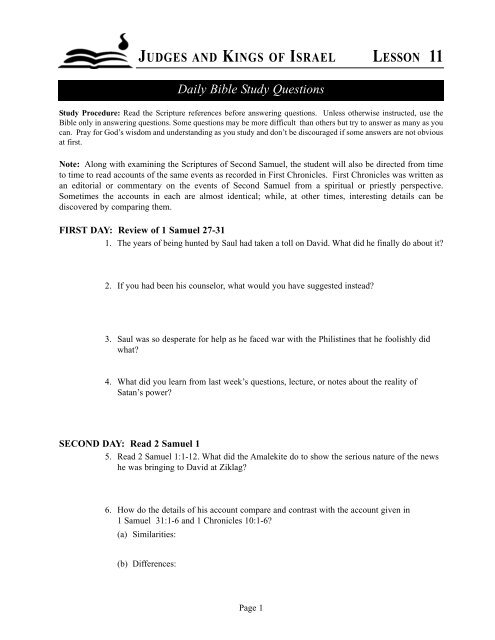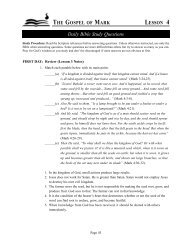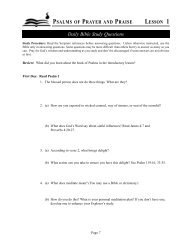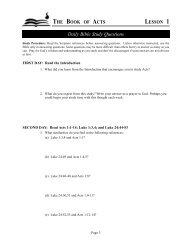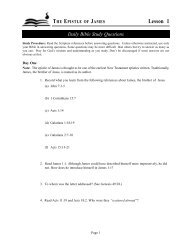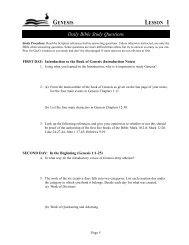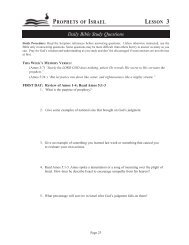JKI Book 2 - 5-04.qxd - Explorer's Bible Study
JKI Book 2 - 5-04.qxd - Explorer's Bible Study
JKI Book 2 - 5-04.qxd - Explorer's Bible Study
Create successful ePaper yourself
Turn your PDF publications into a flip-book with our unique Google optimized e-Paper software.
JUDGES AND KINGS OF ISRAEL<br />
LESSON 11<br />
Daily <strong>Bible</strong> <strong>Study</strong> Questions<br />
<strong>Study</strong> Procedure: Read the Scripture references before answering questions. Unless otherwise instructed, use the<br />
<strong>Bible</strong> only in answering questions. Some questions may be more difficult than others but try to answer as many as you<br />
can. Pray for God’s wisdom and understanding as you study and don’t be discouraged if some answers are not obvious<br />
at first.<br />
Note: Along with examining the Scriptures of Second Samuel, the student will also be directed from time<br />
to time to read accounts of the same events as recorded in First Chronicles. First Chronicles was written as<br />
an editorial or commentary on the events of Second Samuel from a spiritual or priestly perspective.<br />
Sometimes the accounts in each are almost identical; while, at other times, interesting details can be<br />
discovered by comparing them.<br />
FIRST DAY: Review of 1 Samuel 27-31<br />
1. The years of being hunted by Saul had taken a toll on David. What did he finally do about it?<br />
2. If you had been his counselor, what would you have suggested instead?<br />
3. Saul was so desperate for help as he faced war with the Philistines that he foolishly did<br />
what?<br />
4. What did you learn from last week’s questions, lecture, or notes about the reality of<br />
Satan’s power?<br />
SECOND DAY: Read 2 Samuel 1<br />
5. Read 2 Samuel 1:1-12. What did the Amalekite do to show the serious nature of the news<br />
he was bringing to David at Ziklag?<br />
6. How do the details of his account compare and contrast with the account given in<br />
1 Samuel 31:1-6 and 1 Chronicles 10:1-6?<br />
(a) Similarities:<br />
(b) Differences:<br />
Page 1
LESSON 11<br />
JUDGES AND KINGS OF ISRAEL<br />
7. Read 2 Samuel 1:13-16. What had the Amalekite messenger not known about the character<br />
and history of David?<br />
8. Read David’s “Song of the Bow,” a lament for Saul and Jonathan in 2 Samuel 1:17-27<br />
and match the correct answers with the statements below:<br />
_____(a) the thrice-repeated refrain<br />
_____(b) where David did not want the tale told<br />
_____(c) Since these had formed the scene for Saul’s and Jonathan’s deaths,<br />
David wished that they would never be fruitful again so as to be a continual<br />
reminder of the tragedy that had just occurred.<br />
_____(d) Like its owner, this had lost its protective anointing.<br />
_____(e) These respected animals reminded David of the good qualities of Saul and<br />
Jonathan.<br />
_____(f) These had often benefited from the spoils provided from the bravery of Saul and<br />
Jonathan in battle.<br />
_____(g) the particular one of the two whom David greatly mourned<br />
1. eagles and lions<br />
2. the mountains of Gilboa<br />
3. “How the mighty have fallen!”<br />
4. daughters of Israel<br />
5. Jonathan<br />
6. the shield of Saul<br />
7. in Gath or Ashkelon, the cities of the Philistines, lest they rejoice at Israel’s grief<br />
THIRD DAY: Read 2 Samuel 2<br />
9. Read 2 Samuel 2:1-3. Not wanting to make any false moves as he neared possession of<br />
the promised throne of Israel, David prayed for God to direct him. What was God’s answer?<br />
10. Read 2 Samuel 2:4-7. What action did David take toward the brave men of Jabesh Gilead,<br />
who had recovered the bodies of Saul and his sons?<br />
11. Read 2 Samuel 2:8-11. Who opposed David’s right to rule over all Israel and whom did he<br />
set up as a rival king?<br />
Page 2
LESSON 11<br />
JUDGES AND KINGS OF ISRAEL<br />
12. Read 2 Samuel 2:12-32. Abner was the commander of the army of Saul’s son and Joab<br />
was the commander of the army of David. Match the correct answer to each question below:<br />
_____(a) the initial idea for deciding their differences<br />
_____(b) the nephews of David (sons of his sister Zeruiah), who served him as officers<br />
_____(c) the man who killed Asahel<br />
_____(d) Abner’s appeal to Joab in his continued pursuit of Abner and his army<br />
_____(e) the number dead in David’s army<br />
_____(f) the number dead in Abner’s army<br />
_____(g) where Asahel was buried by his brothers<br />
1. twenty<br />
2. Abner<br />
3. Bethlehem<br />
4. three hundred and sixty<br />
5. a competition between twelve chosen soldiers from each army<br />
6. Joab, Abishai, and Asahel<br />
7. “Shall the sword devour forever?...How long will it be then until you tell the people to<br />
return from pursuing their brethren?”<br />
FOURTH DAY: Read 2 Samuel 3<br />
13. Although the civil war continued, David was gaining power.<br />
(a) How was David living in disobedience to God’s will? (See Deuteronomy 17:17.)<br />
(b) Read 2 Samuel 3:1-5 and 1 Chronicles 3:1-9. How many wives and children did David<br />
have?<br />
14. Read 2 Samuel 3:6-12. What made Abner remove his support from Ishbosheth?<br />
15. What verses indicated that Abner had known that God had chosen David to be the rightful<br />
king?<br />
16. (a) On what condition did David agree to make a covenant with Abner?<br />
(b) What advantage would the answering of this request give to David politically?<br />
Page 3
LESSON 11<br />
JUDGES AND KINGS OF ISRAEL<br />
17. Though always loyal to David, Joab often took matters into his own hands—not a good<br />
characteristic in David’s eyes. How did David react to the news that Joab had murdered<br />
Abner?<br />
FIFTH DAY: Read 2 Samuel 4 and 5<br />
18. Read 2 Samuel 4. What son of Jonathan’s was introduced here? Give his name and describe<br />
his physical condition. (This will be important later.)<br />
19. How and by whose efforts did Ishbosheth die?<br />
20. What did David do in response to receiving Ishbosheth’s head and why?<br />
21. Read 2 Samuel 5:1-3 and 1 Chronicles 12:23-40 for the account of David’s being made king<br />
over all Israel. Write down some phrases from the Chronicles reference that describe the<br />
kind of men that came to support David.<br />
22. Read 2 Samuel 5:4-25, 1 Chronicles 11:6-9, and 1 Chronicles 14. Circle the correct answers.<br />
(a) David’s age when he began to reign 1) 25 2) 30 3) 40<br />
(b) Number of years that David reigned 1) 25 2) 30 3) 40<br />
(c) The Philistines bragged that these would keep David out of Zion, later known as<br />
Jerusalem, the city of David. 1) giant warriors 2) horses and chariots<br />
3) the blind and the lame<br />
(d) The name of the man who took David’s challenge to climb up through Jerusalem’s<br />
waterway to conquer the city 1) Jebus 2) Joab 3) David himself<br />
(e) God’s signal for David to move forward in the second battle against the Philistines<br />
1) sound of marching in the tops of the mulberry trees 2) the voice of an angel<br />
3) lightning from heaven<br />
23. How would you characterize David’s fitness for leadership so far?<br />
Page 4
Uniting the Kingdom<br />
Notes<br />
Conflicting Stories (2 Samuel 1:1-16)<br />
First Samuel had concluded with the seriously<br />
wounded Saul falling on his own sword to end his<br />
life. Saul had asked his armorbearer to do this last<br />
service for him to insure that the Philistines would<br />
not torture and shame him, but the armorbearer was<br />
afraid and refused. Second Samuel began with<br />
another version of this account. An Amalekite,<br />
having all the signs of great grief about him, had<br />
come from the battle and approached David. He<br />
told David that Saul and Jonathan were dead. The<br />
Amalekite explained that he had answered Saul’s<br />
request for final relief from his deadly wounds and<br />
had killed Saul. He gave David Saul’s crown and<br />
bracelet as proof. Expecting David to be grateful<br />
and hoping for a reward, the Amalekite must have<br />
certainly been shocked to see David go into a daylong<br />
period of mourning for Saul and Jonathan.<br />
When evening came, David asked the Amalekite<br />
how he had dared “to destroy the LORD’s<br />
anointed”—an action David himself had refused<br />
twice to take. Instead of rewarding him, David<br />
ordered the Amalekite to be executed. David<br />
trusted only in God to make him king; he did not<br />
request or require the help of an assassin.<br />
Whether the Amalekite’s story was true or<br />
whether he came upon the scene of Saul’s death,<br />
overheard Saul’s plea to his armorbearer, and<br />
thought to change the account to ingratiate himself<br />
with David, we cannot be completely sure. The<br />
account in 1 Chronicles 10 corroborated the<br />
account of 1 Samuel 31 but contradicted the version<br />
given by the Amalekite. Unfortunately, it is still not<br />
unusual for people to alter reports to receive<br />
benefits for themselves. Like David, we need to be<br />
discerning in receiving information from people<br />
who have something to gain by our approval. Like<br />
David, too, we need to trust only in God to remove<br />
our enemies and raise us up for His service.<br />
Song of the Bow: A Tribute to Saul<br />
and Jonathan (2 Samuel 1:17-27)<br />
David was a musician and poet as well as a<br />
warrior and king. In this tribute to Saul and<br />
Jonathan, David generously made no reference to<br />
the darker side of Saul’s life, his insane hatred of<br />
David which had caused David to live as an exile<br />
and fugitive from the people over whom God had<br />
anointed him king. The refrain “How the mighty<br />
have fallen” was a mournful cry from the<br />
compassionate heart of David for the king and the<br />
covenant friend he grieved. In the poem he pleaded<br />
for the news to be kept from the Philistines, because<br />
they would rejoice over it, and for a curse to be<br />
placed on the “mountains of Gilboa” to emphasize<br />
perpetually the tragedy that had occurred there. He<br />
then called on the women of Israel to grieve for the<br />
leaders who had so richly blessed them. Finally,<br />
David finished the song by expressing his deep<br />
distress over losing Jonathan, whose loving<br />
friendship he had treasured above anyone else’s.<br />
David ordered this “Song of the Bow” to be taught<br />
to the children of Judah so that they would always<br />
remember their first king and his righteous son.<br />
David, King of Judah<br />
(2 Samuel 2:1-7)<br />
Wisely, David prayed to God for his next<br />
instructions. God told him to leave Ziklag, which<br />
was in Philistia, and go back up to Judah,<br />
specifically to the city of Hebron. David obeyed,<br />
taking his two wives, Ahinoam and Abigail, as well<br />
as the men and their families who had been with<br />
him in exile. They were met by the men of Judah,<br />
the tribe to which David’s family belonged. These<br />
men anointed David as their recognized king over<br />
Judah.<br />
David’s first official action as king was in<br />
keeping with his godly character, even if it was<br />
unusual for someone who had just come to power<br />
after the death of a rival. He sent messengers to give<br />
his thanks to the men of Jabesh Gilead, east of the<br />
Jordan, who had recovered the bodies of Saul and<br />
his sons from their grisly place of display on the<br />
walls of Beth Shan (1 Samuel 31:10-13). David<br />
appreciated their efforts in giving their king and his<br />
sons a proper burial. Although Saul had counted<br />
David as his enemy for many years, David had no<br />
true malice toward Saul. David hoped that the men<br />
of Jabesh Gilead would accept him as their rightful<br />
Page 5
LESSON 11<br />
JUDGES AND KINGS OF ISRAEL<br />
king and support him as he went about gaining the<br />
allegiance of the other tribes.<br />
A Rival King (2 Samuel 2:8-11)<br />
One son of Saul’s had not been killed in the<br />
battle at Gilboa. His name was Ishbosheth (or Esh<br />
Baal according to 1 Chronicles 8:33 and 9:39). The<br />
commander of Saul’s army was named Abner, who,<br />
in an effort to maintain his own position of<br />
authority, took Ishbosheth to Mahanaim, east of the<br />
Jordan, and made him king over that territory. The<br />
civil war continued between the armies of this son<br />
of Saul, king of Israel, and David, king of Judah.<br />
The Sons of Zeruiah<br />
(2 Samuel 2:12-32)<br />
David had a sister named Zeruiah, and<br />
her three sons, Joab, Abishai, and Asahel,<br />
were notorious men of war and loyal to David<br />
(1 Chronicles 2:16). Perhaps prophetic of the “sons<br />
of thunder” Jesus would deal with in James and<br />
John, these sons of Zeruiah would alternately bless<br />
and aggravate David with their undisciplined zeal<br />
on his behalf. At the first encounter with Abner’s<br />
forces after the death of Saul, Asahel, “as fleet of<br />
foot as a wild gazelle,” pursued Abner. Abner,<br />
aware of the revenge that would surely come from<br />
Joab if he hurt Asahel, urged Asahel to stop chasing<br />
him. Asahel persisted and Abner “struck him in the<br />
stomach with the blunt end of the spear,” killing<br />
Asahel. Later, supported by the men of Benjamin,<br />
Abner appealed to Joab to stop the fighting. Joab<br />
agreed and allowed Abner to escape, with Abner’s<br />
forces having sustained many more casualties than<br />
Joab’s. The Lord seemed to be moving David closer<br />
and closer to his place as king over all Israel.<br />
David’s Growing Family<br />
(2 Samuel 3:1-5)<br />
While headquartered at Hebron, David<br />
fathered six sons from six wives. The record of<br />
1 Chronicles 3 added those born to him when he<br />
moved later to Jerusalem: four sons by Bathshua<br />
(i.e. Bathsheba) and nine more sons whose mothers<br />
were unnamed. He also had a daughter named<br />
Tamar and other sons from his concubines. This<br />
indulgence of his sexual appetite, though common<br />
for heathen kings and men of power, had been<br />
specifically prohibited in God’s instructions for<br />
Israel’s future kings recorded in Deuteronomy<br />
17:14-19 (emphasis added):<br />
“When you come to the land which the<br />
LORD your God is giving you, and possess<br />
it and dwell in it, and say, ’I will set a king<br />
over me like all the nations that are around<br />
me,’ you shall surely set a king over you<br />
whom the LORD your God chooses...But he<br />
shall not multiply horses for himself,<br />
...Neither shall he multiply wives for<br />
himself, lest his heart turn away; nor shall<br />
he greatly multiply silver and gold for<br />
himself. Also it shall be, when he sits on the<br />
throne of his kingdom, that he shall write<br />
for himself a copy of this law in a book,<br />
from the one before the priests, the Levites.<br />
And it shall be with him, and he shall read<br />
it all the days of his life, that he may learn<br />
to fear the LORD his God and be careful to<br />
observe all the words of this law and these<br />
statutes, that his heart may not be lifted<br />
above his brethren, that he may not turn<br />
aside from the commandment to the right<br />
hand or to the left, and that he may prolong<br />
his days in his kingdom, he and his children<br />
in the midst of Israel.”<br />
The jealousy and rivalry that would spring up<br />
among the sons of these multiple marriages would<br />
grieve and torment David in later years. Excellent<br />
service to God in some areas of life does not exempt<br />
one from obedience in other areas. Consequences<br />
always follow the disregarding of God’s specific<br />
directions.<br />
Abner Changes Sides<br />
(2 Samuel 3:6-21)<br />
While the civil war continued, “Abner was<br />
strengthening his hold on the house of Saul.” In a<br />
brazen move normally taken only by succeeding<br />
kings, Abner went into one of Saul’s concubines<br />
named Rizpah. Ishbosheth protested what he<br />
recognized to be an over-stepping of authority.<br />
Abner was furious at being challenged by the man<br />
he had made king and swore to change the<br />
allegiance of those he commanded over to David’s<br />
Page 6
LESSON 11<br />
side. Abner even admitted knowing that the Lord<br />
intended David to be the next king of Israel and<br />
pledged to make it happen. Abner sent word to David<br />
about his plan, but David would only make covenant<br />
with Abner on the condition that Saul’s daughter<br />
Michal, David’s first wife, was returned to him. Saul<br />
had given her to another man while David was in<br />
exile. This marriage would strengthen David’s right<br />
to the throne since it united the house of Saul with<br />
the house of David. The current husband of Michal<br />
mourned and followed her, but Abner ordered him to<br />
return to his own home.<br />
Abner rallied the people of Israel to David’s<br />
side. Like a too-smooth politician, he quoted<br />
Scripture that suited his cause: “For the LORD has<br />
spoken of David, saying, ‘By the hand of My servant<br />
David, I will save My people Israel from the hand of<br />
the Philistines and the hand of all their enemies.’”<br />
Abner and his men feasted with David and then left,<br />
promising to unite all Israel for David.<br />
Joab Gets Revenge (2 Samuel 3:22-39)<br />
Shortly after this event, Joab returned<br />
successfully from a military raid he had led. Having<br />
heard of Abner’s offer, he was suspicious of Abner’s<br />
true intentions and warned David of what might<br />
happen. Having failed to change David’s mind<br />
about Abner, Joab took matters into his own hands.<br />
Joab waited for Abner to return to Hebron, took him<br />
aside as if to speak to him privately, and stabbed him<br />
to death. Disregarding what damage might be done<br />
to the efforts of uniting the nation, Joab was<br />
consumed with wanting revenge for the death of his<br />
brother Asahel. David was furious about Abner’s<br />
murder and cursed Joab and his descendants. He<br />
forced Joab to join the public mourning for Abner, at<br />
which David sang a lament for the fallen leader. The<br />
people understood that David was not behind<br />
Abner’s death and continued to be pleased with<br />
David. David expressed his frustration at being<br />
unable to control the sons of Zeruiah, who seemed to<br />
operate on their own authority. David did not punish<br />
Joab then but asked God to “repay the evildoer<br />
according to his wickedness.” Though David would<br />
not live to see it, one day, by order of his son<br />
Solomon, that would happen (1 Kings 2:28-33).<br />
JUDGES AND KINGS OF ISRAEL<br />
Ishbosheth Is Murdered (2 Samuel 4)<br />
After hearing of Abner’s death, Ishbosheth<br />
“lost heart” because he knew his chances of<br />
withstanding David alone were small. Two of<br />
Ishbosheth’s captains had the same feeling and<br />
decided to murder Ishbosheth, which they did while<br />
he was in his own bed. They took his head to David,<br />
hoping for his approval. Like the Amalekite of<br />
chapter one, they underestimated the righteousness<br />
of David. He was horrified that they had killed “a<br />
righteous person in his own house on his bed”!<br />
David had them executed immediately, had their<br />
hands and feet cut off, and, what remained, hanged<br />
by the pool in Hebron. He had Ishbosheth’s head<br />
properly buried in Abner’s tomb. David longed to<br />
trust and wait on God, but he seemed to be<br />
surrounded by people who would not.<br />
King At Last (2 Samuel 5:1-16)<br />
After the death of Ishbosheth, all the tribes of<br />
Israel came to Hebron to make David their king. He<br />
was anointed and he made a covenant with them. He<br />
was thirty when he was made king and reigned forty<br />
years, seven of them over Judah and thirty-three<br />
over a united Israel.<br />
One of his first victories as king was over the<br />
fortified city of Jerusalem, also called Jebus, Zion,<br />
and the City of David. The inhabitants had boasted<br />
that the city was so secure that they would need only<br />
blind and lame people to keep David out. David<br />
issued a challenge for someone to go up the water<br />
shaft to take the city, and the always-bold Joab<br />
responded (1 Chronicles 11:6-9). David made<br />
Jerusalem his capital city and was helped in<br />
building himself a house by the generosity of a new<br />
ally, Hiram, king of Tyre.<br />
The Philistines Attack Again<br />
(2 Samuel 5:17-25)<br />
As was becoming his custom, David asked<br />
God what to do about the Philistines, who had come<br />
up to search for him. God told him to go to war and<br />
assured him of victory. David obeyed, and God<br />
broke through the Philistines, in David’s words,<br />
Page 7
LESSON 11<br />
JUDGES AND KINGS OF ISRAEL<br />
“like a breakthrough of water.” David prayed again<br />
when the Philistines reassembled in the Valley of<br />
Rephaim. This time the directions from God were<br />
different. Instead of facing them directly, they were<br />
to circle around and come up in front of some<br />
mulberry trees. David and his army were to stay put<br />
until they heard the sound of marching in the tops of<br />
the mulberry trees. At that sound, they were to move<br />
forward quickly, and the Lord would go before them<br />
to strike the Philistines.<br />
The peculiar signal of the sound of marching in<br />
the trees perhaps was more than an echo of the<br />
nearby Philistine troops on the move. Some think<br />
that it was the sound of a heavenly army coming<br />
down to do battle for Israel. It would not be the only<br />
time God had sent angelic forces. Whatever the<br />
case, David’s trust in God was again rewarded, and<br />
his place as rightful king of Israel was established.<br />
VOCABULARY<br />
1. assassin: murderer, especially one who murders a politically important person<br />
2. brazen: shameless, impudent<br />
3. corroborate: to support a position or statement with evidence<br />
4. ingratiate: to gain favor or confidence of others by deliberate effort or manipulation<br />
5. malice: the direct intention or desire to harm others<br />
6. zeal: great interest or eagerness<br />
Page 8
LESSON 11<br />
JUDGES AND KINGS OF ISRAEL<br />
Notes<br />
Page 9


